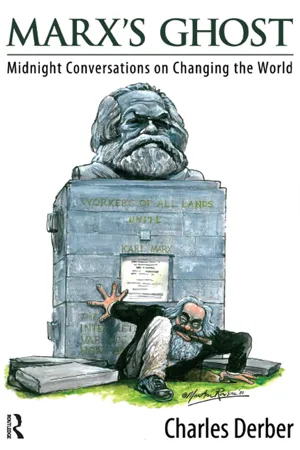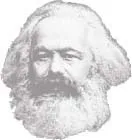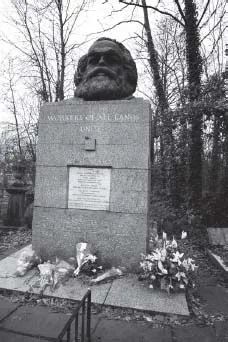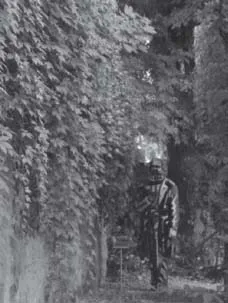
- 176 pages
- English
- ePUB (mobile friendly)
- Available on iOS & Android
eBook - ePub
About this book
Renowned American sociologist Charles Derber imagines a surprise encounter with Karl Marx's ghost in London's Highgate cemetery, leading to a night-long conversation about the problems plaguing the world. The economic crisis, climate change, war, the future of capitalism and the 'Arab Spring' are all discussed. The ghost reconsiders his theories as he speaks eloquently about American labour, environmental, gender and anti-racist struggles. The engrossing, funny and provocative conversation, with appearances from other ghosts such as John Maynard Keynes, offers new insights into the relevance and flaws of Marx's thought, indicating how we can get to a better world.
Frequently asked questions
Yes, you can cancel anytime from the Subscription tab in your account settings on the Perlego website. Your subscription will stay active until the end of your current billing period. Learn how to cancel your subscription.
No, books cannot be downloaded as external files, such as PDFs, for use outside of Perlego. However, you can download books within the Perlego app for offline reading on mobile or tablet. Learn more here.
Perlego offers two plans: Essential and Complete
- Essential is ideal for learners and professionals who enjoy exploring a wide range of subjects. Access the Essential Library with 800,000+ trusted titles and best-sellers across business, personal growth, and the humanities. Includes unlimited reading time and Standard Read Aloud voice.
- Complete: Perfect for advanced learners and researchers needing full, unrestricted access. Unlock 1.4M+ books across hundreds of subjects, including academic and specialized titles. The Complete Plan also includes advanced features like Premium Read Aloud and Research Assistant.
We are an online textbook subscription service, where you can get access to an entire online library for less than the price of a single book per month. With over 1 million books across 1000+ topics, we’ve got you covered! Learn more here.
Look out for the read-aloud symbol on your next book to see if you can listen to it. The read-aloud tool reads text aloud for you, highlighting the text as it is being read. You can pause it, speed it up and slow it down. Learn more here.
Yes! You can use the Perlego app on both iOS or Android devices to read anytime, anywhere — even offline. Perfect for commutes or when you’re on the go.
Please note we cannot support devices running on iOS 13 and Android 7 or earlier. Learn more about using the app.
Please note we cannot support devices running on iOS 13 and Android 7 or earlier. Learn more about using the app.
Yes, you can access Marx's Ghost by Charles Derber in PDF and/or ePUB format, as well as other popular books in Social Sciences & Sociology. We have over one million books available in our catalogue for you to explore.
Information
Part I
I Meet the Ghost

1
Highgate Cemetery
It’s an unusually sunny Sunday afternoon in foggy London. I decide to make a trip to Highgate Cemetery, where many famous writers, including Karl Marx, were buried. The old revolutionary had influenced me in school way back in the 1960s.
Now, during the Great Recession, I was once again thinking about Marx. Time to pay my respects.
I took one of those bright red, double-decker London buses to the cemetery. At the cemetery entrance, a young woman with brown eyes and curly hair stood guard, telling me I had to pay a fee.
“Do any people still come to visit Marx?”
“Oh, quite a few. I often see busloads of giggling Chinese tourists, carrying bouquets of red roses.”
“I didn’t know you had to pay to visit a cemetery. How much to get in?”
“This is a special cemetery.” She talked like she meant it, her eyes sparkling. “One pound, please.”
“Ok, I can handle that. Here you are.”
“Thanks, and enjoy your visit with Mr. Marx.” She laughed in a way that caught my attention. There was something both warm and mysterious in the way she looked at me. I sensed she thought I was going to get more than my money’s worth. I wondered what she was thinking.
She didn’t say anything more, but directed me down a tree-lined lane in this ancient cemetery. As I walked away, I could still hear her sweet but mysterious laugh echoing through the cemetery.
Just five minutes down the path, Marx’s tomb was hard to miss. It is a massive structure, with a huge head of the bearded Marx staring down at you from its perch on top of an imposing marble base. On the upper half of this giant pedestal, I saw the famous final words of The Communist Manifesto: “Workers of All Lands Unite.” On the bottom was engraved another famous quote from Marx: “The Philosophers Have Only Interpreted the World in Various Ways—the Point However Is to Change It.”

This seemed never more true than now, when we face nuclear conflict, global warming, and one of the most severe capitalist crises since the Great Depression. And when we have seen in 2011 astonishing revolutions in the Middle East and new labor struggles beginning in the Midwest and spreading across the United States. Could we be entering a new revolutionary era, rather like that of 1848 when revolutions swept across Europe and gave Marx great hope ? I decided to sit down and stay a while.

2
The Ghost
I found a stone to sit on, and gazed up at Marx’s huge head. Several people walked by. Thinking I am a cemetery worker, they wanted to know where tombstones of other famous British intellectuals are.
“I don’t work here, just visiting,” I say apologetically.
Three young men ask if I would take a photo of them next to Marx’s tomb.
“No problem.” I get up and snap a few pictures.
I sit again. Let my mind float and enjoy the tranquility. It’s a surprisingly peaceful final resting ground for a revolutionary who had not enjoyed a peaceful life.
About 20 minutes later, though, I feel agitation. The atmosphere suddenly changed, and a breeze began to blow. And then I saw the dim outline of what appeared to be some kind of entity in motion, flying up and around Marx’s head. I dismissed it as a trick my eyes were playing on me.
I went back to my reverie, just daydreaming and enjoying the warm sun and beautiful trees and flowers around the tombs of all these famous personalities. I almost fell asleep.
Suddenly, though, a buzzing around my ears got louder, and I could have sworn something was brushing against my face. I got a little scared and got up to walk in a circle, something I do when I’m nervous.
Then, I saw this weird, nearly transparent entity again, now shape-shifting from a blob into something more like the shape of a human. And he’s buzzing and fluttering very close to me.
Believers in the paranormal would have wondered if this was a ghost. I thought, “Let’s play a game. Maybe Marx’s ghost has come to see me.” And the entity did seem to peer at me and wonder who was sitting for so long at the foot of this tomb.
I decided to play along. This must be Marx’s ghost.
“Hope I’m not intruding,” I say politely.
No response. Just more peering and a little more buzzing. Perhaps he was annoyed I was trespassing on his space.
“BOO!! BOOOO!! BOOOOOOO!!!” What else do you say to a ghost? I was just playing around to calm myself and show the ghost he couldn’t scare me.
He didn’t seem amused. He looked harder at me. I hoped that he would forgive my foolishness and trust me, and that he had something to tell me.

3
Marx’s Avatar
When I looked again, I noticed the blob had morphed into a clear outline of a human being, something like an avatar. I blinked my eyes and then closed them for a second, wondering if I was dreaming. When I opened my eyes, I saw a fully formed human male who was the spitting image of Karl Marx.

“I recognize you from your photos,” I said, trying to sound calm.
“I wouldn’t congratulate yourself,” he said curtly, with a distinct German accent. “Anybody would recognize me. All you have to do is look up at my image on my tombstone.”
I glanced up at the gigantic head on the marble pedestal, and then looked back at the ghost. An eerie match.
“You’re right,” I said, trying to placate him and compose myself.
I looked more closely. The man had a large head, with thick black hair and big, bushy black beard. He had swarthy brown skin, and his hands were dark and bristling with shortly curly black hair.
He didn’t speak. I kept staring at him, wide-eyed, eager to take in every detail. He was broad-shouldered, even a bit portly, and of middling height, perhaps about 5’7”. He had piercing eyes and a high, receding forehead, and he appeared strong, moving vigorously. With a waistcoat buttoned up over his large abdomen, he looked like he might be a strong-willed Victorian professor or attorney, except I noticed that one button was missing and his shirt was not freshly starched.
He seemed an intense, cerebral man, not quite at ease in his own body. His face was slightly pockmarked, and he did not look entirely well, perhaps still showing the signs of the chronic digestive and liver problems that he had long suffered from. His head captured my attention. It was impressively large and yet seemed not vast enough for all the thoughts racing inside. I had a sense his interest in me was minimal, a distraction from his never-ending intellectual cogitation.
“What do you want?” he asked with a commanding tone.
“I’ve long had an interest in your work, Dr. Marx,” I said. “I came to pay my respects.”
My deferential tone seemed to please him. “Yes, you are one of many who come to reflect at my tomb.”
“I have so much I want to ask you about,” I said.
“I don’t have the time. I have many problems still to solve, bearing on the possibilities that still remain for the liberation of humanity.”
“But that is precisely why I need to speak with you,” I said with some urgency. “The ideas we are hearing are not solving our crises. The world needs to hear your view of what has caused our current predicament and what we can do about it.”
The ghost chuckled. “Yes, I follow your crises of Wall Street and Main Street. They confirm so much of what I wrote 150 years ago. As do the 2011 revolutions in the Middle East and the labor struggles in the Midwest about the rights and power of unions. Many Americans in my day read my columns in the New York Tribune. I had quite a following. But few in your country seem to be interested in my views now.”
“Perhaps,” I said. “But even some traders on Wall Street began to refer to your work, as they saw the dotcom crash of the late 1990s and the financial system seize up in 2008. I have ex-traders in my courses from big Wall Street banks, who are very interested in your thinking about capitalist economies and crises.”
The Return of Karl Marx
Writing in the New Yorker, journalist John Cassidy reported that he “was talking with a college friend who now worked at a big Wall Street investment bank.… To my surprise, he brought up Karl Marx. ‘The longer I spend on Wall Street, the more convinced I am that Marx was right,’ he said. I assumed he was joking. ‘There is a Nobel Prize waiting for the economist who resurrects Marx … I am absolutely convinced that Marx’s approach is the best way to look at capitalism.’”
“Yes, yes, I know about this increased interest in me. But I am not interested in enlightening your Wall Street community,” he said with some annoyance.
While his eyes had a certain kindness and his manner was entirely polite, this was not a warm and fuzzy ghost. He clearly didn’t suffer fools lightly. While he seemed an imperious and impatient man, I knew his passion for justice was unbounded. I tried to appeal to this side of his nature.
“Dr. Marx, our world is in great crisis, and time is running short. Our workers are in great peril, and millions of our poor are in desperate straits. Workers across the United States and the world are afraid and alienated —and nearly everyone feels the cold breath of what you called egotistical calculation. You foresaw all this. If there is to be a transformation in our economy and our personal lives, your voice needs to be heard again.”
Marx on Capitalism and Egotism
“It [capitalism] has drowned the most heavenly ecstasies of religious fervour, of chivalrous enthusiasm, of philistine sentimentalism into the icy water of egotistical calculation.”
I knew that Marx had received his Ph.D. in philosophy in Germany. While denied a university post because of his radical ideas, as a young man he had quickly ascended into the highest circles of German and French revolutionary thinkers and activists. I knew that while he might be insecure about his social standing, born a Jew and denied mainstream respectability in the academy, he was supremely self-confident about his intellectual and political genius, and he was not free from vanity. I also knew that anyone who could write about the economy and personal alienation as he did was a deeply humanistic man. His friend and famed collaborator, Frederick Engels, had eulogized him as a man loyal and generous, in truth a great humanist personally. Another visitor, after meeting him, said that Marx was civil, with twinkling eyes, hardly the “baby-killer” or murderous monster that some of the press had portrayed. I hoped my respect—and my sincere belief in the extreme importance of his analysis—would soften him toward me.
Frederick Engels’ Eulogy to Marx, March 17, 1883
“And he died beloved, revered and mourned by millions of revolutionary fellow workers—from the mines of Siberia to California, in all parts of Europe and America—and I make bold to say that, though he may have had many opponents, he had hardly one personal enemy.”
“Yes, so much of what I wrote has now come to pass,” he nodded. He seemed contemplative but was not signaling an end to the conversation.
I took this as a possible opening. I was determined to press for the possibility of a more extended conversation with the ghost of one of the most influential men who ever walked the planet.

4
The Ghost Begins to Talk and Explains His Ghostly Powers
As I began to ask the ghost questions, I was already struck by how much he seemed aware of today’s political events and crises. I wondered how could a ghost who lived 150 years ago know anything about today?
“You seem to follow today’s political events closely. How is this possible?”
The ghost chuckled. “You know, we ghosts have time on our hands. I have all the time I need to find out what is happening.” The ghost paused. “And you know we also can travel and read and have som...
Table of contents
- Cover
- Half Title
- Title Page
- Copyright Page
- Dedication
- Table of Contents
- Part I I Meet the Ghost
- Part II TINA Can’t Seduce This Ghost
- Part III Super-Capitalist Crises and the Regime of Death
- Part IV The Ghost Doesn’t Promise a Rose Garden
- Part V The Revolutions of the Great Transition and the Politics of Life
- Part VI What to Do
- Epilogue: The Ghost Takes His Leave
- Notes
- Index
- Acknowledgments